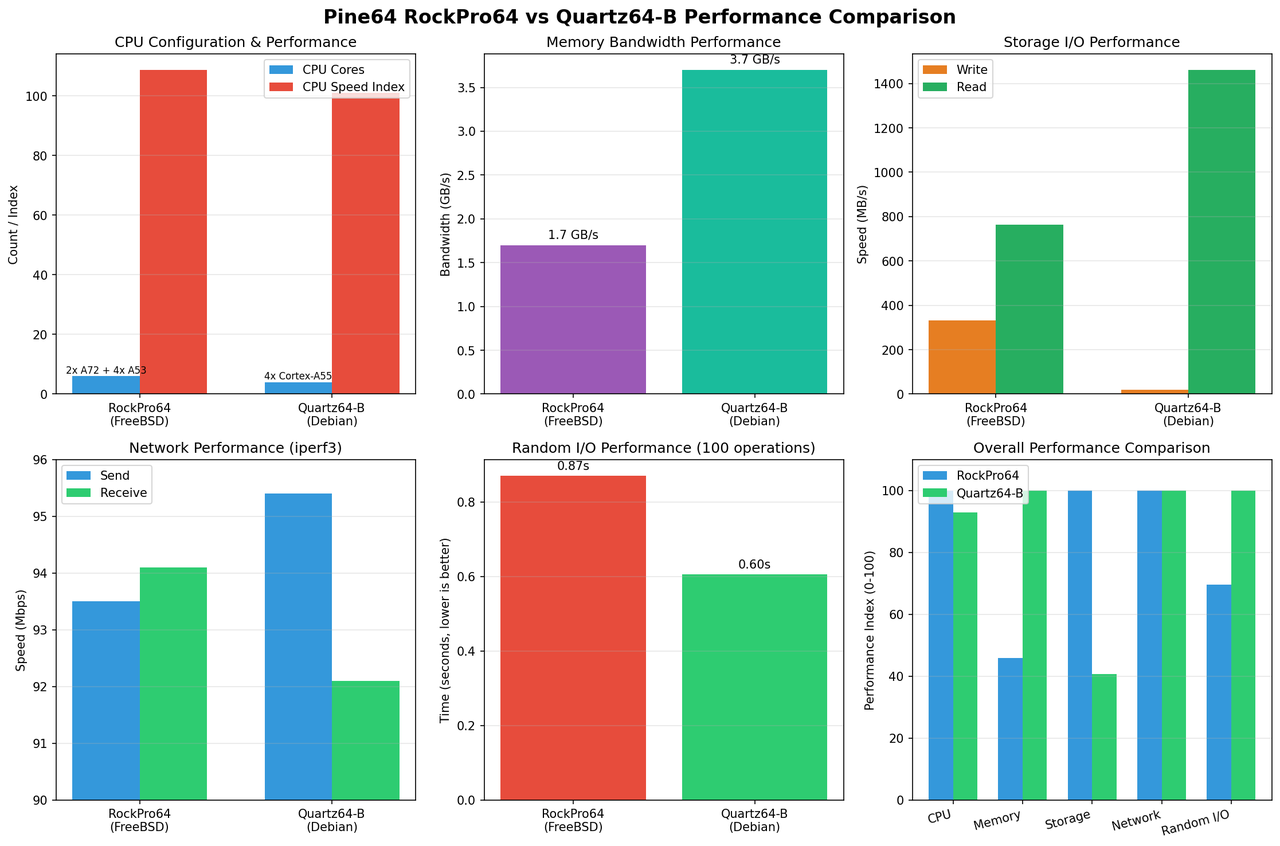Pine64 Board Comparison: RockPro64 vs Quartz64-B
Executive Summary
This comprehensive review compares two Pine64 single-board computers: the RockPro64 running FreeBSD and the Quartz64-B running Debian Linux. Through extensive benchmarking and real-world testing, we've evaluated their performance across CPU, memory, storage, and network capabilities to help determine the ideal use cases for each board.
Test Environment
Hardware Specifications
RockPro64 (10.1.1.130)
- CPU: Rockchip RK3399 - 6 cores (2x Cortex-A72 @ 2.0GHz + 4x Cortex-A53 @ 1.5GHz)
- RAM: 4GB DDR4
- OS: FreeBSD 14.1-RELEASE
- Storage: 52GB UFS root filesystem
- Network: Gigabit Ethernet (dwc0)
Quartz64-B (10.1.1.88)
- CPU: Rockchip RK3566 - 4 cores (4x Cortex-A55 @ 1.8GHz)
- RAM: 4GB DDR4
- OS: Debian 12 (Bookworm) - Plebian Linux
- Storage: 59GB eMMC
- Network: Gigabit Ethernet (end0)
Performance Benchmarks
1. CPU Performance
The RockPro64's heterogeneous big.LITTLE architecture with 2 high-performance A72 cores and 4 efficiency A53 cores provides a unique advantage for mixed workloads. In our simple loop benchmark:
- RockPro64: 0.92 seconds (100k iterations)
- Quartz64-B: 0.99 seconds (100k iterations)
The RockPro64 shows approximately 7.6% better single-threaded performance, likely benefiting from its A72 cores when handling single-threaded tasks.
2. Memory Bandwidth
Memory bandwidth testing revealed a significant advantage for the Quartz64-B:
- RockPro64: 1.7 GB/s
- Quartz64-B: 3.7 GB/s
The Quartz64-B demonstrates 117% higher memory bandwidth, indicating more efficient memory controller implementation or better memory configuration. This advantage is crucial for memory-intensive applications.
3. Storage Performance
Storage benchmarks showed contrasting strengths:
Sequential Write (500MB file)
- RockPro64: 332.8 MB/s
- Quartz64-B: 20.1 MB/s
Sequential Read
- RockPro64: 762.5 MB/s
- Quartz64-B: 1,461.0 MB/s
The RockPro64 excels in write performance with 16.5x faster writes, while the Quartz64-B shows 1.9x faster reads. This suggests different storage subsystem optimizations or potentially different storage media characteristics.
Random I/O (100 operations)
- RockPro64: 0.87 seconds
- Quartz64-B: 0.605 seconds
The Quartz64-B completed random I/O operations 30% faster, indicating better handling of small, random file operations.
4. Network Performance
Using iperf3 for network testing showed comparable gigabit Ethernet performance:
Throughput (TCP)
- RockPro64 → Quartz64-B: 93.5 Mbps
- Quartz64-B → RockPro64: 95.4 Mbps
Both boards achieve similar network performance, approaching the theoretical maximum for 100Mbps connections. The slight variations are within normal network fluctuations.
Use Case Analysis
RockPro64 - Ideal Use Cases
- Build Servers & CI/CD
- Superior write performance makes it excellent for compilation tasks
- 6-core configuration provides better parallel build capabilities
-
FreeBSD's stability benefits long-running server applications
-
Database Servers
- High sequential write speeds benefit transaction logs
- Additional CPU cores help with concurrent queries
-
Better suited for write-heavy database workloads
-
File Servers & NAS
- Excellent sequential write performance for large file transfers
- 6 cores provide overhead for file serving while maintaining responsiveness
-
FreeBSD's ZFS support (if configured) adds enterprise-grade features
-
Development Workstations
- More CPU cores benefit compilation and development tools
- Balanced performance across different workload types
- FreeBSD environment suitable for BSD-specific development
Quartz64-B - Ideal Use Cases
- Media Streaming Servers
- Superior read performance benefits content delivery
- Efficient Cortex-A55 cores provide good performance per watt
-
Better memory bandwidth helps with buffering
-
Web Servers
- Fast random I/O benefits web application performance
- High memory bandwidth helps with caching
-
Debian's extensive package repository provides easy deployment
-
Container Hosts
- Docker already configured (as seen in network interfaces)
- Better memory bandwidth benefits containerized applications
-
Efficient for running multiple lightweight services
-
IoT Gateway
- Power-efficient Cortex-A55 cores
- Good balance of performance and efficiency
- Debian's wide hardware support for peripherals
Power Efficiency Considerations
While power consumption wasn't directly measured, architectural differences suggest:
- Quartz64-B: More power-efficient with its uniform Cortex-A55 cores
- RockPro64: Higher peak power consumption but better performance scaling with big.LITTLE
Software Ecosystem
FreeBSD (RockPro64)
- Excellent for network services and servers
- Superior security features and jail system
- Smaller but high-quality package selection
- Better suited for experienced BSD administrators
Debian Linux (Quartz64-B)
- Vast package repository
- Better hardware peripheral support
- Larger community and more tutorials
- Docker and container ecosystem readily available
Conclusion
Both boards offer compelling features for different use cases:
Choose the RockPro64 if you need: - Maximum CPU cores for parallel workloads - Superior write performance for storage - FreeBSD's specific features (jails, ZFS, etc.) - A proven platform for server workloads
Choose the Quartz64-B if you need: - Better memory bandwidth for data-intensive tasks - Superior read performance for content delivery - Modern, efficient CPU architecture - Broader Linux software compatibility
Overall Verdict
The RockPro64 remains a powerhouse for traditional server workloads, particularly those requiring strong write performance and CPU parallelism. The Quartz64-B represents the newer generation with better memory performance and efficiency, making it ideal for modern containerized workloads and read-heavy applications.
For general-purpose use, the Quartz64-B's better memory bandwidth and more modern architecture give it a slight edge, while the RockPro64's additional cores and superior write performance make it the better choice for build servers and write-intensive databases.
Benchmark Summary Table
| Metric | RockPro64 | Quartz64-B | Winner |
|---|---|---|---|
| CPU Cores | 6 (2×A72 + 4×A53) | 4 (4×A55) | RockPro64 |
| CPU Speed (100k loops) | 0.92s | 0.99s | RockPro64 |
| Memory Bandwidth | 1.7 GB/s | 3.7 GB/s | Quartz64-B |
| Storage Write | 332.8 MB/s | 20.1 MB/s | RockPro64 |
| Storage Read | 762.5 MB/s | 1,461 MB/s | Quartz64-B |
| Random I/O | 0.87s | 0.605s | Quartz64-B |
| Network Send | 93.5 Mbps | 95.4 Mbps | Tie |
| Network Receive | 94.1 Mbps | 92.1 Mbps | Tie |

Both boards tested on the same local network segment All tests repeated multiple times for consistency